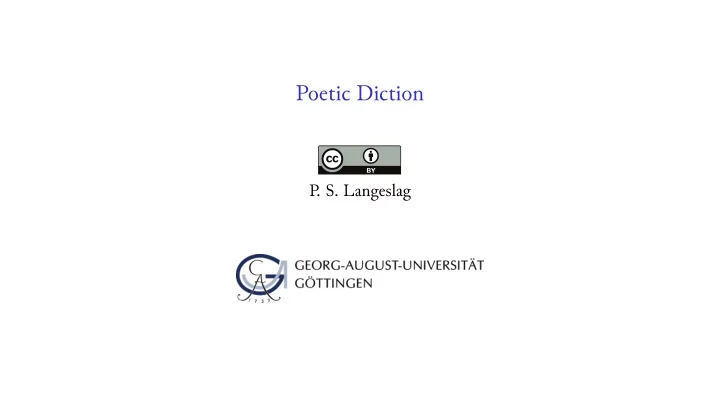

Poetic Diction P . S. Langeslag
The Dictionary of Old English Corpus 3060 “Texts” Table 1: DOEC statistics for the 2009 release A Poetry 177,480 words 6% B Prose 2,128,781 words 70% C Glosses 699,606 words 23% D Glossaries 26,598 words .88% E Runes 346 words .01% F Inscriptions 331 words .01% Total 3,033,142 words Incl. foreign words 3,791,645 words
Hapax legomena Figure 1: Dictionary of Old English hapax search
Comparative Analysis
Compounds 75 Hæfde wederwolcen widum fæðmum eorðan and uprodor efne gedæled, lædde leodwerod , ligfyr adranc, hate heofontorht . Hæleð wafedon, drihta gedrymost. Dægsceades hleo 80 wand ofer wolcnum; hæfde witig god sunnan siðfæt segle ofertolden , swa þa mæstrapas men ne cuðon, ne ða seglrode geseon meahton, eorðbuende ealle cræfue, 85 hu afæstnod wæs feldhusa mæst, siððan he mid wuldre geweorðode þeodenholde . ( Exodus )
2. If we consider their position within the verse line, we can distinguish three categories: a. Words that always alliterate, and thus do not occur as the fourth stress; b. Words that alliterate whenever they occur in a position where alliteration is possible; c. Words with non-alliterating occurrences in both the second and fourth positions of stress. → A hierarchy of “poetic worth” (Cronan). Alliterative Rank 1/2 1. Given a set of synonyms occurring in the poetry, some will more consistently alliterate than others.
Alliterative Rank 1/2 1. Given a set of synonyms occurring in the poetry, some will more consistently alliterate than others. 2. If we consider their position within the verse line, we can distinguish three categories: a. Words that always alliterate, and thus do not occur as the fourth stress; b. Words that alliterate whenever they occur in a position where alliteration is possible; c. Words with non-alliterating occurrences in both the second and fourth positions of stress. → A hierarchy of “poetic worth” (Cronan).
Alliterative Rank 2/2 Table 2: Alliterative rank of three nouns (including compound elements) for “people” in Beowulf Word Occ. 1 Allit. 2 Allit. 3 Allit. 1 Non-Allit. 2 Non-Allit. 4 Non-Allit. % Allit. þēod 20 11 0 4 0 2 3 75% folc 40 17 9 12 0 1 1 95% mǣgþ 7 2 5 0 0 0 0 100% (ECHOE has 741 occurrences of folc , 78 of mǣgþ .)
Heroic Vocabulary Þa se halga heht his heorðwerod 2040 wæpna onfon. He þær wigena fand, æscberendra , eahtatyne and þreo hund eac þeodenholdra , 2043 þara þe he wiste þæt meahte wel æghwylc on fzrd wegan fealwe linde . ( Genesis A )
Metonymic and Metaphorical Uses Table 3: Selection of terms with metonymic or fjgurative senses Term Literal Sense Figurative Senses æsc ash-tree spear; ship lind lime-tree shield bord board ship; shield ecg edge sword īren iron sword swāt sweat blood wudu wood ship; spear “[A]s a group the fjgurative meanings alliterate 28% more fsequently than do the literal.” (Cronan 150)
Tools for the Study of Poetic Diction ▶ Dictionary of Old English ▶ Dictionary of Old English Corpus
Bibliography I Chapman, Don. “Poetic Compounding in the Vercelli, Blickling and Wulfstan Homilies.” Neuphilologische Mitteilungen 103, no. 4 (2002): 409–21. Cronan, Dennis. “Alliterative Rank in Old English Poetry.” Studia Neophilologica 58, no. 2 (1986): 145–58. ———. “Poetic Meanings in the Old English Poetic Vocabulary.” English Studies 84, no. 5 (August 2003): 397–425. ———. “The Poetics of Poetic Words in Old English.” In Old English Philology: Studies in Honour of R. D. Fulk , edited by Leonard Neidorf, Rafael J. Pascual, and Thomas A. Shippey, 256–75. Anglo-Saxon Studies 31. Cambridge: D. S. Brewer, 2016. Griffjth, Mark. “Poetic Language and the Paris Psalter: The Decay of the Old English Poetic Tradition.” Anglo-Saxon England 20 (1991): 167–86.
Bibliography II Lapidge, Michael. “Old English Poetic Compounds: A Latin Perspective.” In Intertexts: Studies in Anglo-Saxon Culture Presented to Paul E. Szarmach , edited by Virginia Blanton and Helene Scheck, 17–32. Medieval and Renaissance Texts and Studies 334. Tempe, AZ: ACMRS, 2008. Stanley, Eric. “Old English Poetic Diction and the Interpretation of the Wanderer , the Seafarer and The Penitent’s Prayer .” Anglia , N.F., 61 (1956): 413–66. Stanley, Eric G. “Old English Poetic Vocabulary: The Formal Word Precise but Not Pedantic.” In Essays on Old, Middle, Modern English and Old Icelandic: In Honor of Raymond P. Tripp, Jr , edited by Loren C. Gruber, 177–200. Lewiston, NY: Edwin Mellen Press, 2000. Wright, Charles D. “ Insula Gentium : Biblical Infmuence on Old English Poetic Vocabulary.” In Magister Regis: Studies in Honor of Robert Earl Kaske , edited by Arthur Gross, 9–21. New York: Fordham University Press, 1986.
Recommend
More recommend